X Prize Planning for Next Space Competition

Breaking space news, the latest updates on rocket launches, skywatching events and more!
You are now subscribed
Your newsletter sign-up was successful
Want to add more newsletters?

Delivered daily
Daily Newsletter
Breaking space news, the latest updates on rocket launches, skywatching events and more!

Once a month
Watch This Space
Sign up to our monthly entertainment newsletter to keep up with all our coverage of the latest sci-fi and space movies, tv shows, games and books.

Once a week
Night Sky This Week
Discover this week's must-see night sky events, moon phases, and stunning astrophotos. Sign up for our skywatching newsletter and explore the universe with us!

Twice a month
Strange New Words
Space.com's Sci-Fi Reader's Club. Read a sci-fi short story every month and join a virtual community of fellow science fiction fans!
WASHINGTON — With its current flagship space competition set to end in less than two years, the X Prize Foundation is starting the planning for its next space-related challenge.
In a Feb. 24 presentation to the Future In-Space Operations working group, Andrew Barton, director of technical operations for the Google Lunar X Prize (GLXP) competition, said the X Prize Foundation is preparing to develop a new space prize to succeed the GLXP.
"X Prize, beyond the Google Lunar X Prize, does want to keep doing this kind of thing," Barton said. The foundation held a prize design workshop at a recent meeting of teams involved in the GLXP, he said, and plans additional such workshops in the future. [Private Moon Race: The Google Lunar X Prize in Pictures]
Barton said the foundation has a road-mapping approach for developing new prizes that it plans to apply to a new space prize. That involves identifying desired future states of the space industry and working backwards, or "backcasting," to the present day to identify key technical challenges that could be solved through the use of a prize.
"The end goal is that, by the time the Google Lunar X Prize is over, we'd like to have to have at least one follow-up space prize that we're ready to enter into the final design phase for with a sponsor," he said. "Hopefully we will be able to launch that space prize soon after the Google Lunar X Prize is complete."
The GLXP is currently slated to wrap up by the end of 2017. The competition offers a $20 million prize to the first non-government team that lands a spacecraft on the moon, travels at least 500 meters across its surface, and returns high-definition video and other data back to Earth. The competition includes a $5 million second prize and several additional bonus prizes.
Sixteen teams remain in the GLXP, at varying levels of technical maturity and financing. Only two teams, Israel's SpaceIL and Florida-based Moon Express, have launch contracts for their lunar missions verified by the X Prize Foundation. The remaining teams have until the end of this year to submit launch contracts to remain in the competition.
Breaking space news, the latest updates on rocket launches, skywatching events and more!
The GLXP is the largest space-related prize run by the X Prize Foundation, but not its first. The foundation got its start in 1996 with a $10 million prize for a commercially-developed suborbital vehicle capable of carrying three people and fly twice in two weeks. Later renamed the Ansari X Prize, Scaled Composites' SpaceShipOne vehicle won the competition in 2004.
The foundation also administered the Northrop Grumman Lunar Lander Challenge, whose $2 million prize purse was provided by NASA's Centennial Challenges prize program. Armadillo Aerospace and Masten Space Systems, who developed vehicles that demonstrated lunar landing technologies, shared the prize purse when the competition ended in 2009.
Despite the organization's space roots, the X Prize Foundation has diversified in recent years so that space is only a small part of its overall portfolio of prize competitions. Besides the GLXP, current prize competitions range from artificial intelligence and global literacy to the development of a "tricorder" to aid in healthcare.
This story was provided by SpaceNews, dedicated to covering all aspects of the space industry.

Jeff Foust is a Senior Staff Writer at SpaceNews, a space industry news magazine and website, where he writes about space policy, commercial spaceflight and other aerospace industry topics. Jeff has a Ph.D. in planetary sciences from the Massachusetts Institute of Technology and earned a bachelor's degree in geophysics and planetary science from the California Institute of Technology. You can see Jeff's latest projects by following him on Twitter.

